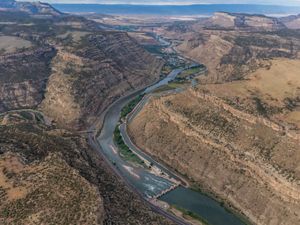Yesterday marked the first anniversary of one of the decade’s most notable conservation victories. Late last February, Congress passed a law to make the Land and Water Conservation Fund (LWCF) permanent. When the president signed it into law shortly after, it secured the program’s future for the first time in its successful 54-year history of bringing conservation benefits across the United States.
As great as it is to finally have certainty for the program, there’s still more work to do to ensure LWCF can reach its full potential for the benefit of all Americans. Now, Congress must finish the job by also providing full, dedicated funding to LWCF. It would be the greatest conservation win in generations, and we're so close to seeing it happen.
Fully and permanently funding LWCF is the right way to honor the promise that was made back in 1965, when it was created as a way to balance the use of one public resource, offshore oil and gas, by conserving another, the nation’s lands and waters. It would also continue the proud, bipartisan conservation legacy of support for conserving America’s greatest places and driving economic, environmental and health benefits.
Since it began, LWCF has invested more than $18 billion in land and water conservation and outdoor recreation across every state and several territories. Nearly every county in the United States has received some LWCF funding to bring us everything from national parks and wildlife refuges to local ballfields and historic sites.
This conservation of our land and water protects access to hike, hunt, fish and enjoy the outdoors, but it also goes beyond traditional thinking.
- The American Battlefield Protection Program, which is funded by LWCF, is the premier tool for protecting our historic battlefields and has funded projects in more than 20 states.
- In New Jersey, millions in LWCF funding has gone toward climate adaptation by protecting coastal wetlands to buffer communities from rising sea levels and increased storm surges.
- In Tennessee, the LWCF acquisition of Rocky Fork in Cherokee National Forest saved the Forest Service considerable maintenance costs by allowing prescribed burning to reduce the risk of wildfires.
- In New York, LWCF protection of Sterling Forest ensures clean drinking water for more than 2 million people and saves municipalities tens of millions of dollars in water treatment costs.
Every year, $900 million a year from offshore oil revenues – not tax dollars – goes toward LWCF. Unfortunately, however, Congress must decide every year how much of that funding the program actually receives. In most cases, LWCF gets less than half of that amount.
Luckily this broken promise can be fixed, and Congress is working on it.
Sens. Cory Gardner, R-Colo., and Joe Manchin, D-W.Va., have introduced legislation to fully dedicate the authorized $900 million to LWCF each year. So far, a bipartisan group of 55 senators has cosponsored the bill. In the House, companion legislation has 233 bipartisan cosponsors.
With more than half of Congress supporting these bills, both of which have passed their respective committees, serious momentum to fund LWCF is building. Recently, Senate Majority Leader Mitch McConnell, R-Ky., cited LWCF full funding as bipartisan legislation Congress could pass during this election cycle. He’s absolutely right.
Full funding for LWCF has broad bipartisan support in Congress and from a diverse collection of businesses, nonprofits, industry trade groups and millions of Americans. LWCF is our best tool to provide access to public lands for recreation opportunities, while at the same time investing in America’s natural resources to save millions in future maintenance costs and spur business growth in every community.
The time is now to build on this momentum and get this done, once and for all. We hope Congress will pass this crucial legislation in the coming weeks.



